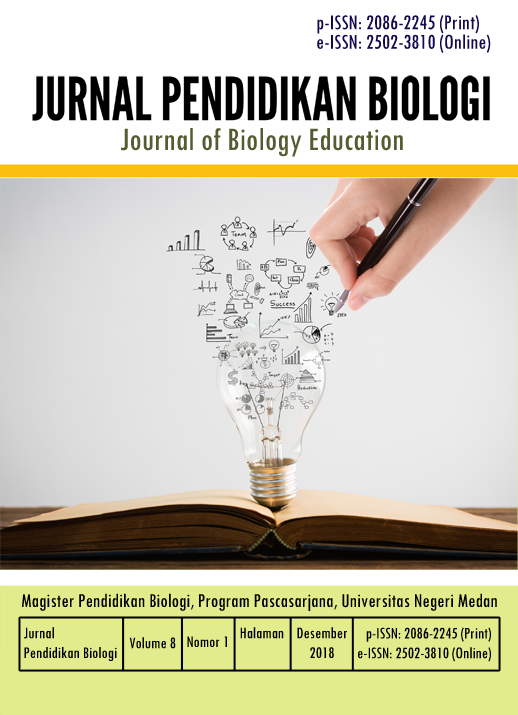Analisis Pembelajaran Biologi dalam Pespektif Inkuiri pada Pembelajaran Menggunakan Kurikulum Kerangka Kualifikasi Nasional Indonesia (KKNI)
DOI:
https://doi.org/10.24114/jpb.v8i1.12101Keywords:
Biology learning, inquiry learning, Indonesia Qualification Framwork CurriculumAbstract
The application of the new curriculum directs more scientific learning by applying the six task method. However, curriculum changes often have obstacles in their implementation. This study aims to analyze the learning environment in biology classes from the perspective of inquiry learning, as one of the most recommended science learning approaches. The research uses descriptive methods, with a population of 121 students from five environmental biology classes who have fully implemented the IQF curriculum. Samples taken by cluster random sampling method obtained two classes with a total of 46 students. Data obtained from questionnaires and learning outcomes documents. The results showed that biology learning activities had a level of conformity with inquiry learning in the "sufficient" category. Data shows that among the components of inquiry activity observed, questioning and hypothesizing are the lowest intensity activities. While communication activities have the highest intensity. It can be concluded that the learning of environmental biology still needs to be improved, especially in questioning and hypothesizing activities.References
Aceska, N. (2016). New science curriculum based on inquiry based learning-a model of modern educational system in Republic of Macedonia. Journal of Education in Science, Environment and Health, 2 (1), 1-12.
Almeida, P. A. (2012). Can I ask a question? the importance of classroom questioning. Procedia - Social and Behavioral Sciences, 31, 634“638.
https://doi.org/10.1016/j.sbspro.2011.12.116
Anderson R. 2007. Inquiry as an organizing theme for science curricula. In: S. Abell & N. Lederman (Eds.), Handbook of research on science education (pp. 807-830). Mahwah, NJ: Lawrence Erlbaum Associates.
Capps, D. K., & Crawford, B. A. (2013). Inquiry-based instruction and teaching about nature of science: Are they happening?. Journal of Science Teacher Education, 24(3), 497-526.
Chan, J. K.-S. (2010). Teachers™ responses to curriculum policy implementation: colonial constraints for curriculum reform. Educational Research for Policy and Practice, 9(2), 93“106. https://doi.org/10.1007/s10671-010-9082-5
Chiappetta, E. L., & Adams, A. D. (2004). Inquiry-based instruction: Understanding how contentand process go hand-in-hand with school science. The Science Teacher, 71(2), 46“50.
Faulconer, E. K. (2016) Investigating the Influence of the Level of Inquiry on Student Engagement. Journal of Education and Human Development, 5(3), 13-19.
https://doi.org/10.15640/jehd.v5n3a2
Sadeh, I., & Zion, M. (2012). Which type of inquiry project do high school biology students prefer: Open or guided?. Research in Science Education, 42(5), 831-848.
Keys, C. W., Bryan, L. A. (2001) Co-Constructing Inquiry-Based Science with Teachers: Essential Research for Lasting Reform. Journal of Research in Science Teaching, 38(6): 631-645.
Koksal, E. A., & Berberoglu, G. (2014). The Effect of Guided-Inquiry Instruction on 6th Grade Turkish Students™ Achievement, Science Process Skills, and Attitudes Toward Science. International Journal of Science Education, 36(1), 66“78. https://doi.org/10.1080/095006-93.2012.721942
Minner, D. D., Levy, A. J., & Century, J. (2010). Inquiry-based science instruction”what is it and does it matter? Results from a research synthesis years 1984 to 2002. Journal of Research in Science Teaching, 47(4), 474“496.
National Research Council. (2000). Inquiry and the national science education standards. Washington: National Academy.
Peraturan Presiden Republik Indonesia Nomor 8 Tahun 2012 Tentang Kerangka Kualifikasi Nasional Indonesia.
Rocard, M., Csermely, P., Jorde, D., Lenzen, D., Walberg-Henriksson, H., & Hemmo, V. (2007). Science Education NOW: A renewed pedagogy for the future of Europe, Brussels: European Commission. Recuperado de: http://ec. europa. eu/research/science-society/documen-t_library/pdf_06/report-rocard-onscience-education_en. pdf.
Singer, J., Marx, R. W., & Krajcik, J. (2000). Constructing extended inquiry projects: Curriculum materials for science education reform. Educational Psychologist, 35, 165“178.
Suyanto, S. (2017, August). A reflection on the implementation of a new curriculum in Indonesia: A crucial problem on school readiness. In AIP Conference Proceedings (Vol. 1868, No. 1, p. 100008). AIP Publishing.
National Research Council. (2012). A framework for K-12 science education: Practices, crosscutting concepts, and core ideas. National Academies Press.
Bunterm, T., Lee, K., Ng Lan Kong, J., Srikoon, S., Vangpoomyai, P., Rattanavongsa, J., & Rachahoon, G. (2014). Do different levels of inquiry lead to different learning outcomes? A comparison between guided and structured inquiry. International Journal of Science Education, 36(12), 1937-1959.
Tseng, C. H., Tuan, H. L., & Chin, C. C. (2013). How to help teachers develop inquiry teaching: Perspectives from experienced science teachers. Research in Science Education, 43(2), 809-825.
Zion, M., & Mendelovici, R. (2012). Moving from structured to open inquiry: Challenges and limits. Science Education International, 23(4), 383-399.
Downloads
Published
Issue
Section
License
Copyright (c) 2019 Jurnal Pendidikan Biologi

This work is licensed under a Creative Commons Attribution 4.0 International License.
Copyright
Penyerahan naskah menyiratkan bahwa karya yang diserahkan belum pernah diterbitkan sebelumnya (kecuali sebagai bagian dari tesis, laporan, atau abstrak). Naskah tidak dipertimbangkan untuk publikasi di tempat lain. Penerbitannya telah disetujui oleh semua penulis bersama. Jika dan kapan naskah diterima untuk publikasi, penulis masih memegang hak cipta dan mempertahankan hak penerbitan tanpa batasan. Penulis atau orang lain diperbolehkan untuk melipatgandakan artikel selama tidak untuk tujuan komersial. Untuk penemuan baru, penulis disarankan untuk mengelola patennya sebelum diterbitkan.
Open Access
Jurnal ini berkomitmen untuk membuka akses bebas yang tidak membebankan biaya kepada pembacanya atau lembaga mereka. Pembaca berhak membaca, mengunduh, menyalin, mendistribusikan, mencetak, mencari, atau menautkan ke teks lengkap artikel, selama tidak untuk tujuan komersial. Jenis lisensi adalah CC-BY-4.0.
Disclaimer
Tidak ada tanggung jawab yang dikenakan kepada Penerbit atau oleh editor untuk kesalahan dan/atau kerusakan pada naskah sebagai akibat dari pernyataan pencemaran nama baik atau dugaan pencemaran nama baik, pelanggaran hak kekayaan intelektual atau privasi, atau kewajiban produk, baik akibat kelalaian atau sebaliknya, atau dari penggunaan atau operasi ide, instruksi, prosedur, produk atau metode apa pun yang terkandung dalam materi di dalamnya.

